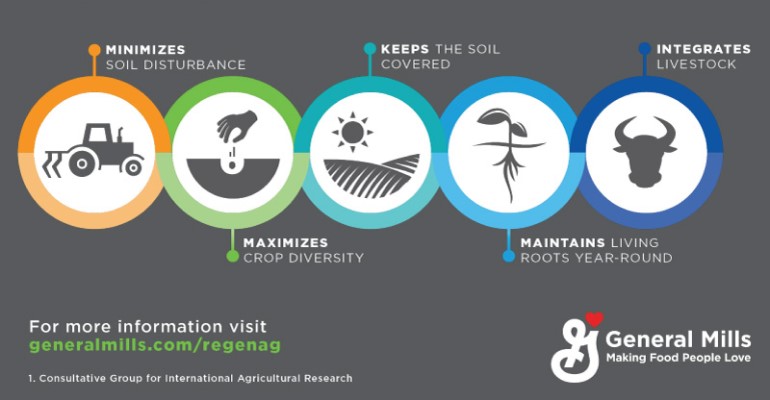General Mills pledges healthy soil practices on 1m acres
Company partnering with organic and conventional farmers to advance regenerative agricultural practices to address carbon emissions.
March 4, 2019

General Mills announced its commitment to advance regenerative agricultural practices on 1 million acres of farmland by 2030. The company will partner with organic and conventional farmers, suppliers and trusted farm advisors in key growing regions to drive the adoption of regenerative agriculture practices, the company said in a statement.
"We have been feeding families for over 150 years, and we need a strong planet to enable us to feed families for the next 150 years," said Jeff Harmening, General Mills chairman and chief executive officer. "We recognize that our biggest opportunity to drive positive impact for the planet we all share lies within our own supply chain and by being a catalyst to bring people together to drive broader adoption of regenerative agriculture practices."
General Mills estimated that the global food system accounts for roughly one-third of greenhouse gas (GHG) emissions and 70% of water consumption.
General Mills explained that regenerative agriculture is a holistic method of farming deploying practices designed to protect and intentionally enhance natural resources and farming communities. These practices focus on pulling carbon from the air and storing it in the soil, in addition to helping the land be more resilient to extreme weather events. General Mills will partner with key suppliers to drive adoption across key ingredients, including oats, wheat, corn, dairy feed and sugar beets.
"Our first on-farm training and education academies will focus on North American growers, where we source high-quality oats for Cheerios, Annie's, Cascadian Farm, Nature Valley and Blue Buffalo," said Jon Nudi, president of North American Retail for General Mills.
General Mills is granting $650,000 to nonprofit organization Kiss the Ground to support farmer training and coaching through Soil Health Academies, where growers will learn how to increase farm profitability, build resiliency into the land and decrease input costs using soil health practices.
"Investing in soil health and regenerating our soils has numerous benefits, including water infiltration, reduced pest pressure, resilience to unpredictable weather and reducing greenhouse gasses," said Lauren Tucker, executive director of Kiss the Ground. "We have an opportunity to not just sustain our natural resources but to restore them for generations to come. We can only advance the adoption of these practices that benefit people and the planet if we partner with and support our farmers."
The announcement builds upon the company's commitment to improve soil health and to reduce its absolute GHG emissions by 28% across its full value chain by 2025. General Mills reported that it is nearly halfway to that goal, with its GHG emissions footprint down 13% in 2018 compared to 2010.
General Mills also drives awareness of regenerative agriculture with consumers through its brands. For example, in 2018, Annie's launched two limited-edition products with ingredients grown using regenerative practices and this year will offer two additional regenerative agriculture products: Macaroni & Classic Cheddar and Shells & White Cheddar. Cascadian Farm, in partnership with The Land Institute, is working to commercialize organic Kernza, a perennial grain whose 10 ft.-long roots are able to capture carbon and water while preventing soil erosion. Also, EPIC Provisions is helping connect mission-based companies to progressive livestock producers using regenerative practices. Its Sweet & Spicy Sriracha Beef Bites product was the first consumer packaged product to feature the Savory Institute Land to Market Ecological Verification Outcome seal, which measures outcomes versus practices.
General Mills is leading the development of measurement science to connect regenerative agricultural practices, like no-till and cover cropping, to environmental and economic outcomes, such as:
Healthy soil -- Carbon-rich, biologically active soil plays an essential role in cleaning and storing water, supporting biodiversity and regulating the climate.
Above-ground biodiversity -- Diversity in crop varieties, grazing animals, wildlife and pollinators supports resilient ecosystems that can better withstand disease, pests and climate fluctuations.
Farmer economic resilience -- Regenerative agricultural practices can strengthen whole-farm profitability and resilience over time.
Healthy soil is the foundation for regenerative agriculture, and since 2015, the company has invested more than $4 million to advance soil health initiatives. Previous and ongoing examples of General Mills' work include:
Development of The Soil Health Roadmap, in partnership with The Nature Conservancy, which outlines key steps to achieve widespread adoption of soil health systems on more than 50% of U.S. cropland by 2025. These efforts could deliver $50 billion in societal benefits annually.
Development of a regenerative agriculture self-assessment tool to help farmers understand how their practices influence soil health, biodiversity and economic resilience.
A strategic sourcing agreement with Gunsmoke Farms LLC to convert 34,000 acres of conventional farmland in South Dakota to certified organic acreage, using regenerative agricultural practices, by 2020.
"We need companies like General Mills who have the scale and commitment to create sustainable agricultural systems," said Larry Clemens, North America region agriculture director for The Nature Conservancy. "Efforts to improve soil health and enrich biodiversity are critical to addressing climate change and other environmental challenges."
You May Also Like



